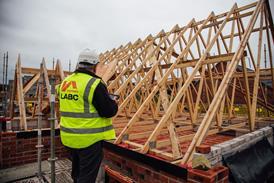After five turbulent months, the Cherry family’s attempts to buy Countryside Properties finally seem to be coming to fruition.
“Emotionally, it’s been a roller-coaster”, says Alan Cherry of his five-month struggle to realise the long-cherished ambition of buying the company he chairs. Now he may be just a week away from taking the keys to Countryside Properties.
“There have been moments almost day by day over the past few weeks, when you think: ‘That’s it’,” he says. But the real breakthrough came two weeks ago when Rock Pacific, the investment fund that was Countryside’s biggest shareholder, and which was threatening to bid itself, said it would support the Cherry family’s 280p-a-share offer for Countryside.
Cherry says it was a “big relief” when Rock Pacific finally called him at his office to say it would support the buyout and sell Cherry its 28.1% stake. This meant that the Cherry family’s biggest stumbling block was removed – at a cost of £4m, which was how much the family had to find to increase its bid from 275p a share to 280p. The final bid valued the company at £222m.
It is not quite a done deal yet. Countryside’s other shareholders have until Wednesday to vote against the buyout. They are unlikely to do so, however, as the only rival bid was for 250p made by an unknown third party.
Cherry is clearly disappointed that he was growled into increasing his bid: “It is above the price we would have preferred to pay, but if you want something enough you will stretch yourself,” he says. “It’s human nature.”
Over the past five months, the Cherrys have had frequent meetings with Daniel Levy, a shareholder in Rock Pacific – and chairman of Tottenham Hotspur – and Paul Kemsley, Rock Pacific’s chief executive. These have been tense. As Cherry puts it: “Rock was not a welcome interest, to be frank. We did not see eye to eye on the way the business should be taken forward.”
The Cherry family – Alan and his two sons Graham and Richard, who are chief executive and new business director respectively – have been talking about the possibility of a management buyout for the past three years.
If the buyout is successful, the Cherrys will increase their 17% stake to 50%; Alan, Graham and Richard will each take one-third of this. The family’s backer, Halifax Bank of Scotland, will own the remaining half, but the Cherrys have the option to buy that at a later date. Outright ownership, according to Alan, is Graham and Richard’s ultimate aim.
Although Cherry admits to being “a young 71”, he says one of the key motivations for the buyout was to enable his sons to increase the amount of equity they had invested in the company. This will increase their financial gains and equalise control of the company.
“They will be partners in terms of equity, and there will be no question of me being the big ogre,” says Cherry.
Another motivation for the buyout was Cherry’s determination to end speculation in the City, and among other housebuilders, about a possible takeover of the company. Countryside was the target of criticism from analysts and investors last year after it posted three profit warnings in what was regarded as a boom time for the housing market and Countryside’s rivals.
It’s above the price we would have preferred to pay, but if you want something enough you will stretch yourself
Alan Cherry
This criticism probably made the buyout easier to achieve, as it led to a dip in the value of Countryside’s shares. Cherry dismisses accusations that the buyout was opportunistic, or that he bought the company on the cheap.
He insists that 280p is a good price, and there have been no rival offers to suggest that it undervalued the company.
Cherry says Countryside’s uneven financial performance is the result of its focus on regeneration work. Regeneration projects tend to lead to a lumpy flow of work, and do not therefore lend themselves to the kind of smoothly ascending graphs and short-term financial gains that the City likes to see.
“Volume housebuilders such as Persimmon, Wimpey and Taylor Woodrow have the volume and can deal with it,” he says. “Unless you’re like Persimmon, verging on the FTSE-100, you are not able to satisfy the short-term aims of the stock market investor.”
He also rejects the notion that a public company was not the right place for a boardroom run by three members of the same family. “Why not?” he asks. “That’s how the likes of Sainsbury’s and Cadbury started out, and I have worked very successfully with my two sons for 20 years.”
The past few months have been unsettling for the company, for the Cherry family, for the staff, for the shareholders and for Countryside’s clients and partners. But now that the uncertainty surrounding the buyout looks set to end, Cherry says it will be business as usual.
Countryside will continue to focus on regeneration. It is already working with English Partnerships in Greenwich, south-east London, and has recently been selected by Salford council to regenerate the town.
However, life will be different in some ways. Countryside will be freed from the administrative shackles that come with reporting to the stock exchange.
Cherry says: “We spent 60 days a year with financial press relations people, analysts and shareholders. We’re not grumbling, but we will have 60 more days to apply ourselves to the nuts and bolts of the business.”
Cherry has no intention of hanging up his boots just yet. And after those five months of uncertainty and speculation, he is looking forward to getting back to his day job.
From public to private
Countryside is not the first housebuilder to seek private status. In November 2001, Philip Davies, chief executive of Linden Homes, sealed a £73m management buyout of the Surrey-based firm, backed by the Bank of Scotland. He says he hasn’t looked back since: “You are in control of your own destiny, and have the ability to make long-term decisions.”
Davies expects the trend to continue: “There will be consolidation at the top with the quoted volume players, and then there will be the niche companies, and there is no room for them in the quoted arena.”























No comments yet